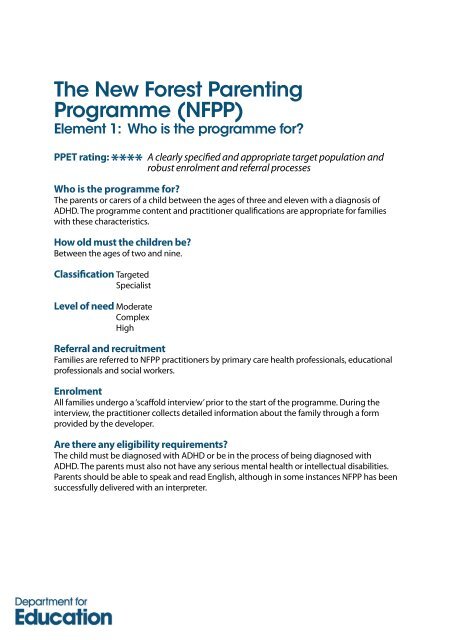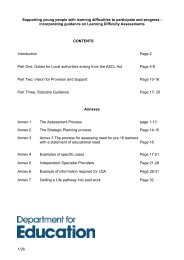The New Forest Parenting Programme (NFPP)
The New Forest Parenting Programme (NFPP)
The New Forest Parenting Programme (NFPP)
You also want an ePaper? Increase the reach of your titles
YUMPU automatically turns print PDFs into web optimized ePapers that Google loves.
<strong>The</strong> <strong>New</strong> <strong>Forest</strong> <strong>Parenting</strong><br />
<strong>Programme</strong> (<strong>NFPP</strong>)<br />
Element 1: Who is the programme for?<br />
PPET rating: **** A clearly specified and appropriate target population and<br />
robust enrolment and referral processes<br />
Who is the programme for?<br />
<strong>The</strong> parents or carers of a child between the ages of three and eleven with a diagnosis of<br />
ADHD. <strong>The</strong> programme content and practitioner qualifications are appropriate for families<br />
with these characteristics.<br />
How old must the children be?<br />
Between the ages of two and nine.<br />
Classification Targeted<br />
Specialist<br />
Level of need Moderate<br />
Complex<br />
High<br />
Referral and recruitment<br />
Families are referred to <strong>NFPP</strong> practitioners by primary care health professionals, educational<br />
professionals and social workers.<br />
Enrolment<br />
All families undergo a ‘scaffold interview’ prior to the start of the programme. During the<br />
interview, the practitioner collects detailed information about the family through a form<br />
provided by the developer.<br />
Are there any eligibility requirements?<br />
<strong>The</strong> child must be diagnosed with ADHD or be in the process of being diagnosed with<br />
ADHD. <strong>The</strong> parents must also not have any serious mental health or intellectual disabilities.<br />
Parents should be able to speak and read English, although in some instances <strong>NFPP</strong> has been<br />
successfully delivered with an interpreter.
How are the needs of parents assessed and monitored?<br />
<strong>The</strong> family’s needs are initially assessed during the scaffold interview. <strong>The</strong> practitioner<br />
may also use standardised measures to assess each family’s needs during the interview.<br />
During the programme, the family’s needs are assessed through:<br />
• Practitioner observations during each visit<br />
• Parents completion of a weekly diary<br />
• A progress check at the end of week four and week eight.<br />
How are parents referred onto other services?<br />
Practitioners are expected to be familiar with the systems available for referring families<br />
onto other services within their local area. Each family’s need for additional services is also<br />
assessed during practitioner supervision.
Element 2: What are the content and activities<br />
of the intervention?<br />
PPET rating: **** Strong theoretical framework and content<br />
How is the programme delivered?<br />
A single practitioner delivers the programme over eight weekly sessions. Each session lasts<br />
two hours.<br />
Where is the programme delivered?<br />
In the family’s home.<br />
<strong>NFPP</strong><br />
What do parents learn during the sessions?<br />
Parents learn about the nature of ADHD and strategies for managing their child’s behaviour<br />
and attention. In many of the sessions, the practitioner introduces games that help the<br />
parent engage the child’s attention, increase his or her concentration, wait patiently and take<br />
turns. <strong>The</strong> content for the eight sessions are as follows:<br />
• Week 1: (parent only) <strong>The</strong> practitioner discusses the nature of ADHD with the parent<br />
and introduces simple strategies, such as the use of praise and eye contact, to<br />
manage the child’s behaviour and attention.<br />
• Week 2: (parent only) <strong>The</strong> practitioner reviews the weekly diary with the parent and<br />
discusses the child’s behaviour. Parents learn how to develop routines, communicate<br />
clear messages, set limits and avoid confrontation.<br />
• Week 3: (parent and child) Parents learn how to manage their child’s temper<br />
tantrums and difficult behaviour through the use of firm limits and distraction<br />
strategies.<br />
• Week 4: (parent and child) Parents learn how to use time out and quiet time<br />
effectively.<br />
• Week 5: (parent only) <strong>The</strong> practitioner and parent assess the success of the new<br />
strategies.<br />
• Weeks 6&7: (parent and child) <strong>The</strong> practitioner observes the parent and child<br />
interacting for 15 minutes. <strong>The</strong> practitioner then provides feedback about the<br />
quality of the interaction.<br />
• Week 8: (parent only) <strong>The</strong> practitioner reviews the key messages from the<br />
previous weeks and discusses strategies for managing behaviours that may still be<br />
challenging.<br />
What is the scientific basis for the content?<br />
<strong>NFPP</strong> is based on evidence from the neurosciences about the nature of ADHD, theories of<br />
child development, social learning theory, behavioural theory and cognitive behavioural<br />
theory.
How does programme work? (What is the theory of change?)<br />
<strong>NFPP</strong> assumes that the ADHD child’s behaviour and attention problems can be ‘scaffolded’<br />
by the parent through positive, reciprocal interactions with the child. <strong>NFPP</strong> therefore<br />
teaches parents how to be supportive of their ADHD child’s needs, set appropriate limits<br />
and select appropriate, yet challenging goals. Effective parent scaffolding will, in turn, help<br />
the child better regulate his or her behaviour and increase his or her ability to concentrate.<br />
Constructive<br />
and positive<br />
parent and child<br />
interactions help<br />
ADHD children<br />
better manage<br />
their attention and<br />
impulses<br />
Parents learn to:<br />
• Reduce negative<br />
responses to their<br />
child<br />
• Respond more<br />
positively to their<br />
child<br />
• Enforce limits<br />
• Scaffold their child’s<br />
attention and selforganisation<br />
skills<br />
Short-term goals:<br />
In the short term, it is expected that there will be improvements in:<br />
• Parents’ knowledge about the nature of ADHD<br />
• Parents’ use of strategies for managing ADHD<br />
• Children’s behaviour and impulsivity<br />
• <strong>The</strong> parent-child relationship.<br />
Long-term goals:<br />
In the long term, it is expected that:<br />
• Children will have fewer symptoms of ADHD<br />
• Parents will experience less stress.<br />
Children are better<br />
able to manage<br />
their impulses and<br />
attention<br />
• Children’s behaviour<br />
improves<br />
• Children can<br />
concentrate better<br />
• Parents experience<br />
less stress<br />
• <strong>The</strong> parent-child<br />
relationship improves<br />
How do parents learn during the programme?<br />
Parents learn from practitioner instruction and modelling, role-play, homework<br />
assignments and discussion. Parents also learn from practitioner feedback provided during<br />
games that aim to increase the child’s attention and reduce impulsive behaviour.<br />
Parental engagement:<br />
Home visiting ensures that parents can attend the sessions and that the activities are<br />
relevant to the family’s needs. <strong>The</strong> practitioners also receive extensive training on how to<br />
motivate parents and develop a supportive relationship with them.
Element 3: How are practitioners<br />
trained and supported?<br />
PPET rating: **** Prepared for implementation with fidelity<br />
Practitioner qualifications:<br />
<strong>The</strong> developers recommend that the practitioners have a minimum qualification of a QCF<br />
Level 4/5. However, given the complexity of the programme content and the families’<br />
levels of need, it is recommended that this programme be delivered by practitioners with<br />
a QCF Level 6 or higher. This is especially important, since the developers have found that<br />
the programme is less effective when delivered by non-specialist primary care health<br />
professionals.<br />
Practitioners suitable to deliver the programme include clinical psychologists, educational<br />
psychologists, primary mental health workers, health visitors and school nurses.<br />
Practitioners are also expected to have worked with parents and children for at least two<br />
years.<br />
Practitioner training:<br />
Practitioners attend three days of training covering:<br />
• <strong>The</strong> theoretical background of the programme<br />
• <strong>The</strong> programme content<br />
• Parent recruitment, retention and referral.<br />
Practitioners also receive a detailed manual providing step-by-step guidance on the setup<br />
and delivery of the programme.<br />
Accreditation:<br />
Accreditation is awarded to practitioners who can demonstrate they can deliver the<br />
programme to a high standard and with fidelity to the programme model. This is done<br />
by the practitioner providing videotapes of themselves implementing the programme<br />
and then receiving weekly feedback from the programme developers. Practitioners must<br />
provide videotapes from programmes completed with two families.<br />
Systems for maintaining fidelity and quality assurance:<br />
Fidelity is maintained through the following processes:<br />
• <strong>The</strong> accreditation process<br />
• Fidelity checklists<br />
• Follow-up training.<br />
<strong>NFPP</strong>
Supervision requirements:<br />
• Supervision is provided by the programme developers during practitioner<br />
accreditation. Once the practitioner is accredited, it is expected that supervision<br />
will be provided by the host agency or by <strong>NFPP</strong> peers.<br />
• <strong>NFPP</strong> supervisors are expected to have minimum of a QCF Level 6 qualification.<br />
• <strong>NFPP</strong> would benefit from more detailed guidance about the supervision and<br />
support for <strong>NFPP</strong> supervisors.<br />
Wide-scale dissemination:<br />
<strong>The</strong>re is currently no system in place for training experts who can then independently<br />
train trainers. This means that practitioners can only be trained by the programme<br />
developer.<br />
Implementation support:<br />
<strong>The</strong> programme developers meet with the host agency for a scoping meeting prior to<br />
the practitioner training. Practitioners are also expected to obtain a signed agreement<br />
from their manager that they will have the time to deliver the programme once they have<br />
completed training.
Element 4: <strong>The</strong> strength of the programme’s<br />
evidence<br />
PPET rating: **** Promising evidence of effectiveness<br />
<strong>The</strong> <strong>New</strong> <strong>Forest</strong> <strong>Parenting</strong> <strong>Programme</strong> has promising evidence of reducing the<br />
symptoms of ADHD in the short term from two randomised controlled trials. <strong>The</strong> findings<br />
are described briefly below.<br />
Population, study design and measures<br />
Study 1. Sonuga-Barke et al. (2001)<br />
<strong>The</strong> parents of 78 preschool children with<br />
symptoms of ADHD were randomly assigned to 1)<br />
<strong>NFPP</strong>, 2) parent counselling and support, 3) a waitlist<br />
control group. Mothers completed standardised<br />
measures of parent and child behaviour before<br />
attending the course and 15 weeks afterwards.<br />
Study 2. Thompson et al. (2009)<br />
Forty-one preschool children were randomly<br />
assigned to a revised version of <strong>NFPP</strong> and treatment<br />
as usual. Mothers from both groups completed<br />
standardised measures of parent and child<br />
behaviour and participated in a coded videotape<br />
session before the start of the programme and nine<br />
weeks after its completion.<br />
Significant outcomes<br />
<strong>NFPP</strong><br />
Significant improvements in<br />
mothers’ wellbeing and children’s<br />
ADHD symptoms were observed<br />
for families attending <strong>NFPP</strong> in<br />
comparison to parents receiving<br />
counselling or assigned to the<br />
wait-list control group.<br />
Significant improvements in<br />
the children’s ADHD symptoms<br />
were observed for families<br />
participating in <strong>NFPP</strong> in<br />
comparison to families receiving<br />
treatment as usual. <strong>The</strong>re were<br />
also significant improvements<br />
in the parents’ competency<br />
during the videotaped sessions,<br />
although there were no<br />
improvements in the mothers’<br />
self-reports of wellbeing in<br />
comparison to the control group.<br />
Additional research:<br />
<strong>NFPP</strong> is continually being developed within a larger programme of research. Currently,<br />
the programme is completing a randomised controlled trial in the USA that should be<br />
complete in 2014. <strong>The</strong> feasibility of <strong>NFPP</strong> with hard-to-reach families is also currently being<br />
investigated in the UK.
References:<br />
Sonuga-Barke, E.J.S., Thompson, M., Daley, D., and Laver-Bradbury, C. (2004). Parent training for Attention Deficit/<br />
Hyperactivity Disorder: Is it as effective when delivered as routine rather than as specialist care? British Journal of Clinical<br />
Psychology, 43, 449 – 457.<br />
Sonuga-Barke, E.J.S., Daley, D., Thompson, M., Laver-Bradbury, C., and Weeks, W. (2001). Parent-based therapies for<br />
preschool Attention-Deficit/Hyperactivity Disorder: A randomized, controlled trial with a community sample. Journal of<br />
the American Academy of Child and adolescent Psychiatry, 40, 402 – 408.<br />
Thompson, M.J.J., Laver-Bardbury, C., Ayres, M., Le Poidevin, E., Mead, S., Dodds, C., Psychogiou, L., Bitsakou, P., Daley,<br />
D., Weeks, A., Brotman, L.M., Abikoff, H., Thompson, P., Sonuga-Barke, E.J.S. (2009). A small-scale randomized controlled<br />
trial of the revised <strong>New</strong> <strong>Forest</strong> parenting programme for preschoolers with Attention Deficit/Hyperactivity Disorder.<br />
European Child and Adolescent Psychiatry, 18, 605 – 616.
















